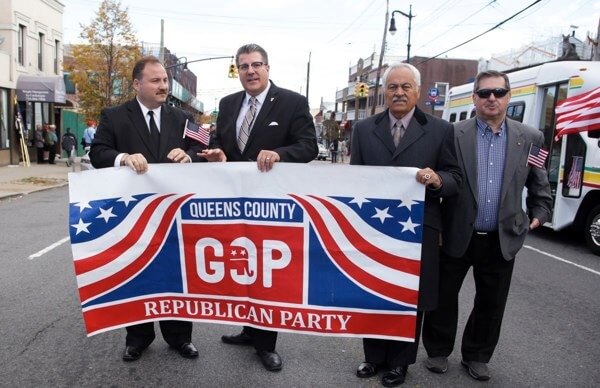By Mark Hallum
Queens County GOP chairman Bob Turner, a former congressman from southern Queens, has rebuilt the party in a predominately Democratic borough and put forth a large group of candidates to challenge incumbents in the Nov. 8 election. Despite the fact the Democrats were able to hold off their opponents, the newly struck unity among Republicans is a far cry from the polarization which existed among its members up until very recently and divided loyalties to the party’s leadership.
“Running a Republican in Queens is not easy since you have about a four-to-one registration disadvantage,” said Turner, who pointed out that Republicans still have not been competitive in getting their message out in comparison to their liberal counterparts. But the right demographic is still in Queens, untapped by the GOP, in the form of suburban homeowners whose values mirror that of what is commonly referred to as the “party of family values,” he said.
Although none of the Republican candidates got through in this election at the state and federal level, Turner was happy with the numbers coming back on Election Night.
In Queens, where Republican presidential candidate Donald Trump was born, he captured 22 percent of the vote – second to Staten Island among the five boroughs.
In the area from Howard Beach to Maspeth, Republican Michael Conigliaro had 34 percent of the vote in the race against incumbent state Sen. Joseph Addabbo (D-Howard Beach), who walked away with 59 percent. Republican Tony Nunziato lost with 29 percent of the vote to Democrat Brian Barnwell in the race for deposed state Assemblywoman Margaret Markey’s (D-Maspeth) seat. These were districts where residents have been in upheaval over City Hall’s policy of placing the homeless in motels.
According to Turner, bringing the party back together was a challenging ordeal which involved giving out resources to field candidates, many of whom had little to no experience in politics, and going big for long-shot victories. Turner admitted the GOP would be in the minority for a while, but getting candidates out into the public view is a good start.
One observer formerly involved in the Queens GOP was critical of Turner’s approach, however, contending that the strategy was a “shotgun” approach to a goal which requires emphasis on individual campaigns in districts with potential.
“I think you want to show that you can run candidates in every district,” the source said. “However, you have to be smart and strategic about where you run races, because there’s not a lot of money out there… I think you have to really pick and choose where you run candidates. Just to say you ran candidates in every district is great, but who won?”
The geographic divide within the Queens GOP Party was what the source referred to as “the 38 Parallel.”
Northern Queens was splintered off from southern Queens with City Councilman Eric Ulrich (D-Ozone Park) and Bob Turner leading in the south and the late GOP Chairman Phil Ragusa in the north.
“There was a long-lasting feud in Queens for many, many years, and it got to the point where no one knew why the feud was still going on” the source said, explaining how the death of Ragusa in 2014 brought disagreements to the surface. Turner was named successor 18 months ago as an “easy look” for the party, but on the condition that district leaders were given primaries along with an equal share of the executive committee of Queens County. This agreement was not honored.
Reach reporter Mark Hallum by e-mail at mhall




































